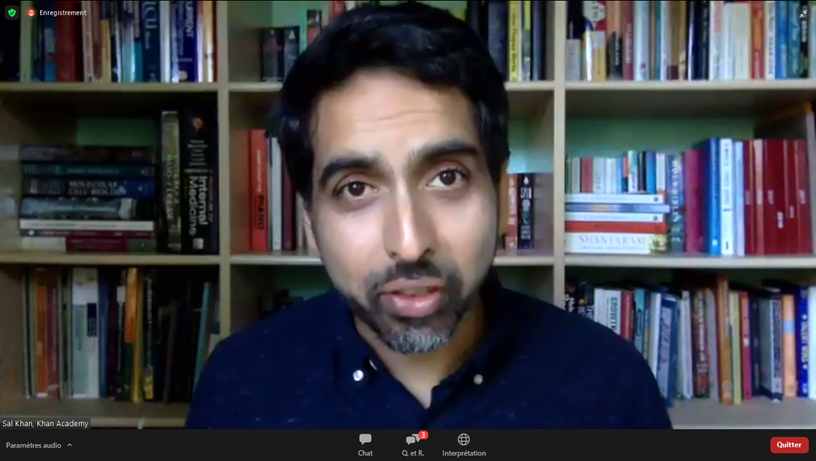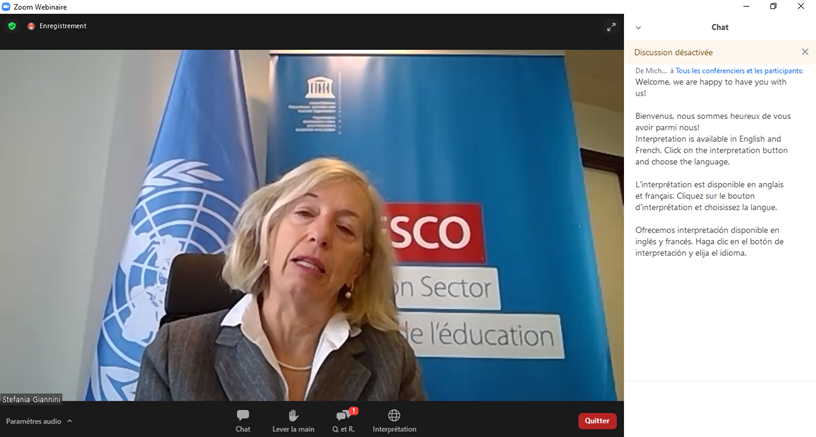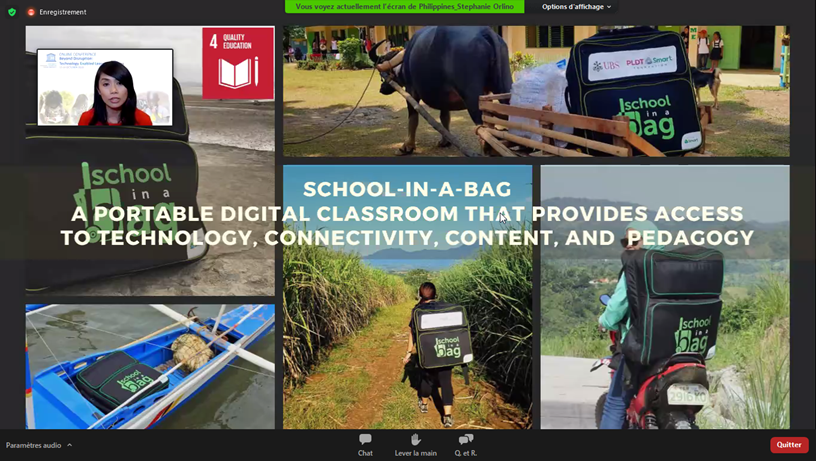UNESCO Mobile Learning Week 2020
From October 12 to 14, UNESCO held its 2020 edition of Mobile Learning Week (MLW), which provided a global perspective of the challenges of maintaining educational systems during the pandemic. Panelists from across the world related their stories, discussed challenges, and presented some of their initiatives to try to ensure that no children were left behind during this period. What follows are some highlights of the 3-day conference.
Originally scheduled for early March 2020, the in-person MLW event was cancelled when the propagation of COVID-19 was taking hold in Europe. This year’s theme was Beyond Disruption: Technology Enabled Learning Futures. Presentations from UNESCO staff, governments, private industry partners and even renowned educator Salman Khan of Khan Academy punctuated the program of the conference.

Salman Khan, founder of Khan Academy addresses participants during his presentation entitled Khan Academy: Past, Present and Future.
A virtual marvel of ICT technology
For those considering holding an on-line conference in the future, the logistics for this virtual event were exemplary and truly something to behold. From initial self-registration on the MLW website in the weeks leading up to the conference, to the live event on Zoom, to the posting of videos after the conference, the conference was a case study in connectedness!
Attendees had the option to register in advance for the conference to receive links and passwords to attend using Zoom in webinar mode, or could simply audit the majority of the sessions which were also simultaneously broadcast on a live YouTube feed and through Facebook Live. Simultaneous translation was offered from French to English or English to French, as required. Zoom users had a special Interpretation button appear that could be toggled to switch between French and English audio channels. YouTube and Facebook Live had separate links to follow for English or French audio. Most of the sessions were recorded and links to these recordings were subsequently uploaded to Vimeo and embedded into the MLW 2020 website.
The shock to school systems worldwide
The opening address by UNESCO’s Assistant Director-General for Education, Stefania Giannini recounted the impact of the global pandemic on educational systems around the world. She informed us that during the peak of the pandemic, 90 % of the world’s school population of 1.6 billion children were out of school. As of October 2020, current estimates place the number at 500 million in 35 countries that remain affected by school closures.

UNESCO’s Assistant Director-General for Education, Stefania Giannini addresses conference attendees in the opening panel. Note the Q&R and Interpretation buttons in the user interface.
Education systems relied on technology from the beginning of the health crisis and it will continue to be a key part of the response to assure the continuity of learning. The challenge is not so much to connect schools, but to connect and train teachers and ensure learners have the technology to follow. Different ministers of education employed various solutions from high to low-tech. The Internet was certainly used, but radio and television were also enlisted to bolster the educational response to COVID-19. In some cases, the learning curve was very steep to deploy remote learning solutions. Stefania Giannini related that a number of governments and ministries have affirmed to UNESCO that their countries have seen more innovation in the last months than over the last few decades.
She closed her presentation with an appeal for everyone to work together to define how to use technology to meet the enormous challenges and to ensure that accessibility to education continues during the next phase of the pandemic. She called on education ministers to protect their education budgets despite the temptation for some governments to cut back in favour of other priorities. Subsequent panelists in the opening plenary reiterated the vital importance of ensuring education continues for vulnerable populations and particularly for girls during the global pandemic who face specific societal challenges in some countries.
International response
Over the course of the conference, a number of panelists from countries around the world presented the responses from their countries.
On the first day of the conference, panelists from Finland, Kenya and South Sudan recounted their respective realities and reactions to the challenge of the pandemic. Each used the technologies that were readily available to ensure that students continued to learn.
It was striking to hear about Finland’s response which resembled what we experienced in Quebec, and heartening to hear of Kenya’s initiatives to expand Internet penetration in the country. This is being achieved through public-private partnerships for subsidized data plans for smartphones which are more widely distributed than other computing devices and Internet subscriptions in homes. South Sudan’s presentation reminded us of how particularly fortunate we are in Quebec. In addition to dealing with the challenges of the health crisis, South Sudan is in the process of consolidating peace after coming out of war.
The level of distance learning infrastructure between the UNESCO countries varied to a great degree. Some countries were concerned with home Internet connectivity and devices, others were working to deploy a state-run learning management system and cloud infrastructure. Egypt had already put tablets in the hands of grade 2 children (rich or poor) and negotiated a partnership with 30 publishers for digital content through a state-led initiative that began a few years ago. Others countries were faced with more daunting challenges like a lack of access to reliable electricity and teacher shortages.

The School-in-a-bag initiative in the Philippines strives to connect learners across their 7000 islands.
One of the most intriguing presentations during MLW 2020 was led by Stephanie Orlino of Smart Communications Inc. She presented the School-in-a bag project in the Philippines that fundraises equipment for mobile teachers to reach remote learners across the 7000 islands of the Philippines. It is a country which is particularly impacted by earthquakes and typhoons in addition to managing the current health crisis.
A typical school-in-a-bag pack includes :
- solar panels
- a battery charging unit
- a laptop with mobile wifi for teachers
- tablets for students that are preloaded with learning content
- an LCD projector
The project places emphasis on developing autonomous learners who also use worksheets from a distance learning program (Central Visayan Institute Foundation program) to continue their learning despite the numerous challenges and lack of infrastructure.
A brief presentation of the school-in-a-bag project
Final thoughts
Multiple members of the UNESCO administration reiterated the importance of the technological response to ensure that learning continues during the second wave, while also entreating private technology partners to support initiatives that provide free universal access to education across the world. They reminded us that technology should address disparities and not amplify inequality across nations.
MLW 2020 was rich in content and full of inspirational stories of reaching children around the world during this trying time in our lives. It was pleasing to see the emphasis on learners with special needs, vulnerable learners and social justice as part of the design of curriculum. It is well worth the time investment to review the conference web site and watch some of the presentations. They will leave you inspired and energized as you witness the importance of our structuring contribution to children as educators.

